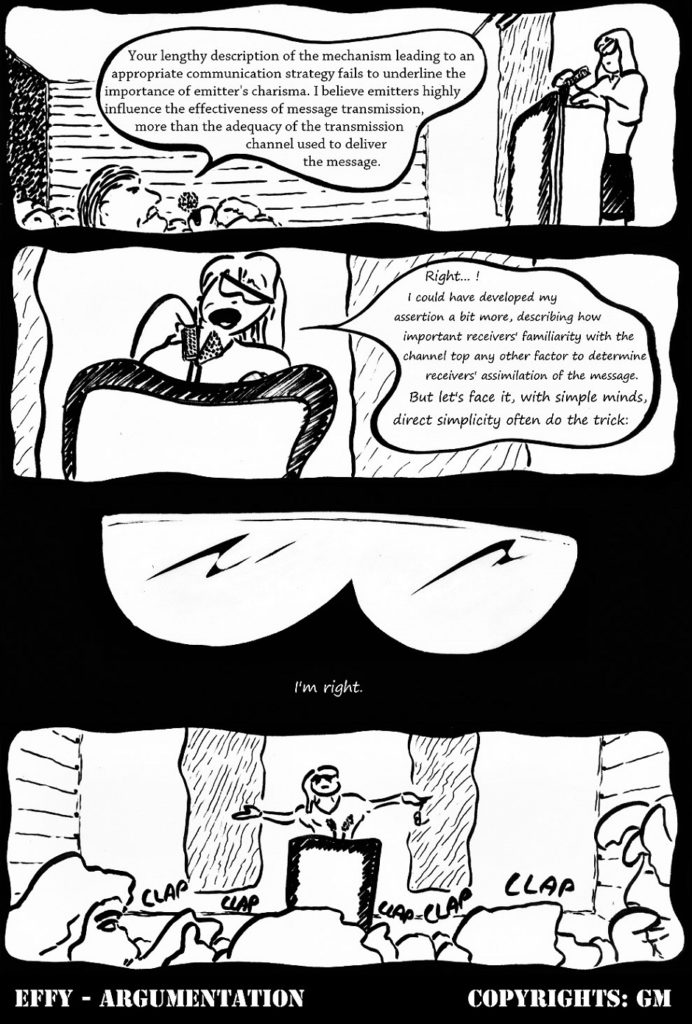G.M.’s new ongoing webcomic series “Effy – The Living Efficiency” keeps poking the bear. The second round of 4 episodes goes as far as providing enough material to argue against procreation itself!
Foggy thoughts as I exit the bed… only perturbed by the cold edges of my kid’s toys ruthlessly stabbing my bare feet. My resolve on autopilot, I carry myself to the kitchen, just before sun rays deign light up the place. Mechanically, I spoon black powder, pour down the boiling water from the kettle over it, and throw in a white cube to sweeten the bitter ordeal. A sip. Senses start to slowly infuse my useless torpor. First coffee of the day, once a daily ritual, now a necessity; must probably be the definition of an addiction. Noon and the third cup already. I consciously refuse to review all the negative effects (link to “coffee for us” blog) that over consumption of caffeine must have on me. World consumption trends (from ICO website) slightly soothes me. I clearly am not alone in this. I did try to stop, but my social and work life greatly suffered from the lack of concentration and energy. And Effy in all that? Efficiency being a result, it’s heavily dependent on the resources that are fed into the process. So, artificially boosting these resources could drastically improve inefficient processes. As such coffee acts as the perfect orthotics (from Collins dictionary) to any human resource based process.
Argumentation and persuasion was already a topic in Aristotle time, when they established the classic ethos, pathos & logos theory. Still greatly effective, this theory was conceived in an easier world, a world where the audience had a somewhat less diversified cultural background. Take ethos for example, finding a common vector of legitimacy for a group of local Greeks must have been easier than finding one for group of global partners attending a meeting virtually from around the world. Markets differ, but what remain is that businesses must convince to be successful; managers must convince staff to earn their badge of leadership; people must convince their entourage to get the upper edge on dinner’s menu, and do on. So, with globalization and digitization, persuasion gets more complex and challenging, though all the more crucial to get a competitive advantage. Some would limit the scope of their public; adapting the message to fully convince a narrow yet targeted audience, for which Aristotle principles would be easier to apply. Some would try to simplify the message; reaching out to a wider audience they could partially convince. And finally, we can’t forget a last group, the one who understood the economical potential that a complex process generate. That group developed countless strategies and principles to prey on our quest of mastering the art of persuasion. Example you ask? Just type “how to persuade” in your browser and you will probably find numerous books, training and principles (often contradicting themselves), with a hefty price tag. That being said, all these new principles do bring additional insight you can use on your daily approach of persuasion, and some good material could include:
- Forbes’ 21 principles of persuasion.
- Argumenter pour mieux convaincre (in french).
Effy relies on simplicity… merging ethos, pathos and logos in one single sentence, carrying all its weight across: “She’s right!”. Pun aside, from personal experience such technique has been surprisingly efficient when facing public with large socio-cultural differences…
I tried to picture the best way to let freshers grasp the all-mighty benefits from mastering bargainig and negotiation techniques… and that strip came out. As the title suggests, in this one Effy goes through take-it-or-leave-it (tioli), faking and affect effect to get her wishes. Joke aside, bargaining is a must have knowledge for anyone, so I often introduce Changing Minds’s page on negotiation tactics to newly hired collaborators. I have been doing that for decades now, and it really helped boost the team ability to weight on company decisions. It also help defuse blatant attempt from other stakeholders at leading the negotiation. Drawbacks of course, is that it does complexify yearly appraisal and salary increase discussions, but isn’t that for the best?
World population evolution:
~2.5 billion => year of my mother’s birth.
~4.5 billion => year of my wife’s birth.
~7.1 billion => year of my daughter’s birth.
My brain sometimes wonder what the world was like the day my grand mother opened her eyes for the first time. I nonchalantly filter my surrounding, erasing two third of people, buildings, vehicles… erasing two third of everything. I let my imagination wander, molding various surreal scenarios: chaotic unsanitary mess without electricity and sewage system, lush and vibrant nature with drinkable brook and clear sky, and so on… These trains of thoughts are always great starting points to brilliant venture. As for Effy, she’s still questioning the issue. Pondering pros and cons of modifying the balance of resources between the human one and the other ones.
Sources and further reading: Thought Co’s Current World Population // Country Meters // World O Meters












